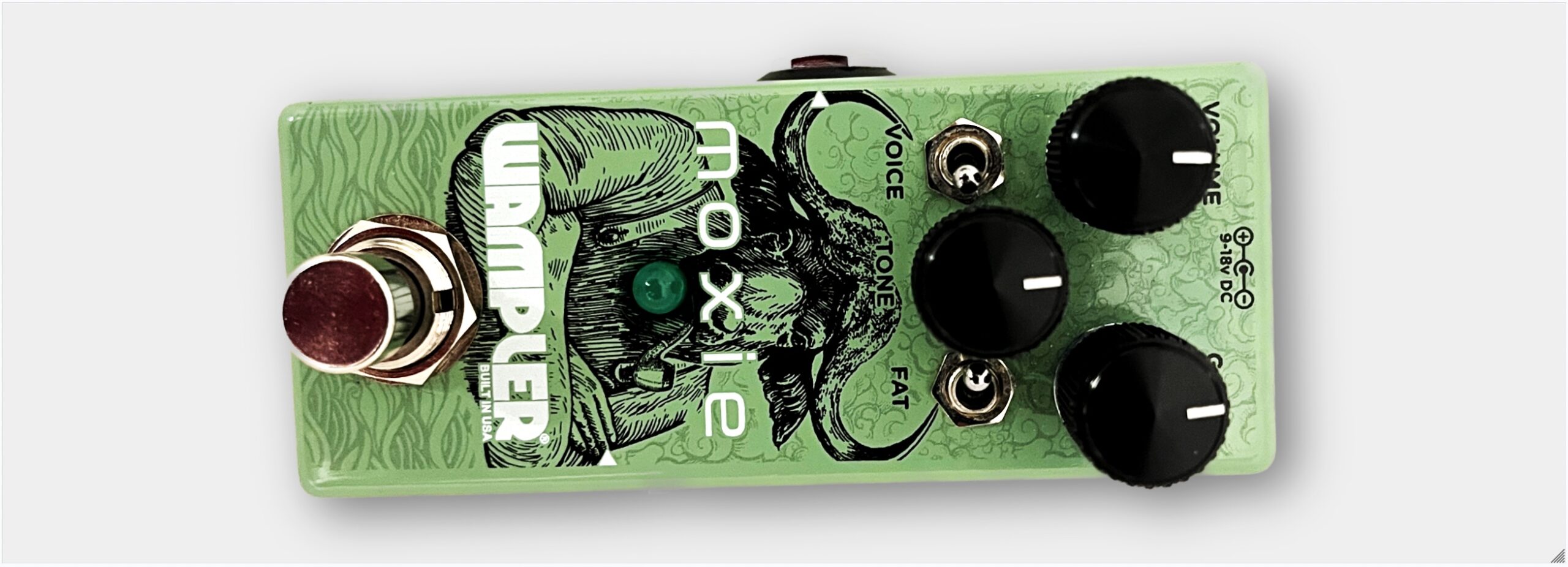
By Ian Waters
Posted 09/01/2024
The Wampler Moxie – For The Love of Lime
The Wampler Moxie Overdrive is Wampler Effect’s take on the Tube Screamer, an all-time classic with the attendant tweaks, small footprint and attention to detail that has come to be associated with the boutique brand. Specifically, the Moxie is an homage to the Ibanez TS10, one of the Tube Screamers made famous by blues guitarists Stevie Ray Vaughan and later John Mayer, who utilized the mid range boost and hefty volume on tap to define modern sounds of round, bell-like Fender clean tones and searing overdriven lead lines when engaging the TS10. Since then, the vintage market for these pedals has spawned an entire industry of clones and variants with a range of tweakability and reverence for old chips. Wampler maintains the tradition by employing the original 4558 chip and layout while adding an extra mosfet gain stage to allow for further saturation to achieve a Dumble-esque sound. We tried the Moxie with a Stratocaster, Les Paul and Telecaster through a silverface Fender Deluxe Reverb.
Layout and Design
Wampler’s reputation has been built on quality construction and a small footprint. Like their nearly ubiquitous Klon Centaur “klone”, the Tumnus, the Moxie boasts an economically shaped 1.5” x 3.5” x 1.5” enclosure, and the same quality of potentiometer pots and small switches for adjustment.
The Moxie uses a traditional three-knob design and adds to extra parameters. The first of which, “voice”, addresses the original Tube Screamer’s defining and sometimes polarizing characteristic, which is a prominent mid range that allows for cut and definition in a mix, but doesn’t get along with all players’ styles. This switch adjusts to allow a fuller spectrum of bass and treble for a more “natural” sounding range of sounds. The second of which, “fat”, engages the second stage of gain. While increasing the amount of gain on tap, this mode further apes the Dumble sound by aiming to sound more like another boutique offering, the Zen Drive made famous by blues and jazz legend Robin Ford.
In Application
When the pedal is engaged, the mid range characteristics of the Tube Screamer is immediately recognizable. The sound, often described as a “honk”, is there in every kind of guitar that we demoed. With both single-coils and even more so with humbuckers, the Moxie colors the sound when engaged and all dials at noon. Playing chords or multiple notes at once can feel muddy on a Les Paul but offer some further punch and prominence with single and double lead lines. Not surprisingly, the Stratocaster’s quack and glassy personality shines the most here. In either case, the gain style shines in blues and rock stylings. Engaging the voice switch allows for perhaps less characteristically recognizable sounds and more versatility. Indeed, when playing with humbuckers in this setting, the result is simply more. Overall though, the “fat” switch alters the sound most dramatically.
Adding the second mosfet gain stage seems to add a dimension to the guitar, allowing for impressive headroom and a fuller range of dynamics to control from the guitar’s knobs. This feature is especially rewarding when looking to play medium to high gain styles, especially when using the Les Paul, bringing the player well into the Dumble/ZenDrive territory. Overall, the pedal shines in its most classic application: stock settings with single-coils for singing, punchy blues, and rock.
Who Is the Moxie For?
With untold iterations and variations of this circuit on the market, where does the Moxie fall? The Moxie offers the non-Tube Screamer enthusiast a new color in the color box without having to commit too strongly to the large, single purpose pedals readily available but still have high end components and craftsmanship. The simple answer is anyone who wants a compact, reliable and versatile drive pedal. However, this pedal is tailored for the modern guitarist who is decidedly a Tube Screamer lover and wants a little more bang for the buck and without forfeiting much money or space on a pedalboard.
